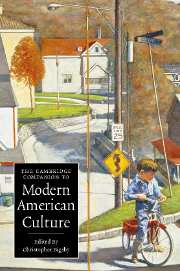Book contents
- Frontmatter
- 1 Introduction: What, then, is the American?
- 2 The American century
- 3 The regions and regionalism
- 4 Immigration to the United States in the twentieth century
- 5 Religion in the United States in the twentieth century: 1900-1960
- 6 Shifting boundaries: religion and the United States: 1960 to the present
- 7 The Hispanic background of the United States
- 8 African Americans since 1900
- 9 Asian Americans
- 10 Women in the twentieth century
- 11 Queer America
- 12 The United States, war, and the twentieth century
- 13 The culture of the Cold War
- 14 Secret America: the CIA and American culture
- 15 Vietnam and the 1960s
- 16 New York City and the struggle of the modern
- 17 Music: sound: technology
- 18 African American music of the twentieth century
- 19 Hollywood cinema
- 20 Popular culture
- 21 Theatre
- 22 Society and the novel in twentieth-century America
- 23 “Preferring the wrong way”: mapping the ethical diversity of US twentieth-century poetry
- Index
- Series List
9 - Asian Americans
Published online by Cambridge University Press: 28 January 2007
- Frontmatter
- 1 Introduction: What, then, is the American?
- 2 The American century
- 3 The regions and regionalism
- 4 Immigration to the United States in the twentieth century
- 5 Religion in the United States in the twentieth century: 1900-1960
- 6 Shifting boundaries: religion and the United States: 1960 to the present
- 7 The Hispanic background of the United States
- 8 African Americans since 1900
- 9 Asian Americans
- 10 Women in the twentieth century
- 11 Queer America
- 12 The United States, war, and the twentieth century
- 13 The culture of the Cold War
- 14 Secret America: the CIA and American culture
- 15 Vietnam and the 1960s
- 16 New York City and the struggle of the modern
- 17 Music: sound: technology
- 18 African American music of the twentieth century
- 19 Hollywood cinema
- 20 Popular culture
- 21 Theatre
- 22 Society and the novel in twentieth-century America
- 23 “Preferring the wrong way”: mapping the ethical diversity of US twentieth-century poetry
- Index
- Series List
Summary
As the rest of the nation, and indeed the world, prepared to commemorate the one-year anniversary of the September 11 terrorist attacks, a quieter remembrance was taking place in the halls of Asian American Studies programs around the United States. There was a special kind of grief at UCLA's Asian American Studies Center on September 6, 2002, when director Don T. Nakanishi issued a press release announcing the death of Yuji Ichioka on September 1. For more than three decades, Ichioka held the position of Senior Researcher at the Center; he taught the Center's first class shortly after its establishment in 1969. An award-winning author, he was effectively the creator of Asian America in the sense that, in 1968, while a young graduate student at the University of California at Berkeley, he coined the term “Asian American,” and helped found the anti-Vietnam war, antiracist student group, the Asian American Political Alliance. The Asian students at San Francisco State College, who along with black, Chicana/o, Native, and leftist white students shut down the school for five months in a historic strike to call for, among many things, the establishment of a School of Ethnic Studies, might opt to identify themselves more as part of the “Third World Liberation Front” than a self-identified racial group, but gradually “Asian American” became the accepted descriptive term.
- Type
- Chapter
- Information
- The Cambridge Companion to Modern American Culture , pp. 174 - 193Publisher: Cambridge University PressPrint publication year: 2006
- 38
- Cited by



